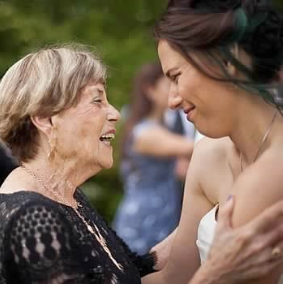Cult Classic Movie Musicals
 Ten years ago, you would have found Laurel Shulman writing and directing musicals to raise funds for local nonprofits. “Making something out of nothing” was her and her community theatre's credo. She learned that making connections builds community. “It’s that simple, it’s that essential and it’s that beautiful,” says Laurel. She suspects she first learned the power of building connections from her grandmother, a woman who continues to demonstrate this ethos and skill flawlessly.
Ten years ago, you would have found Laurel Shulman writing and directing musicals to raise funds for local nonprofits. “Making something out of nothing” was her and her community theatre's credo. She learned that making connections builds community. “It’s that simple, it’s that essential and it’s that beautiful,” says Laurel. She suspects she first learned the power of building connections from her grandmother, a woman who continues to demonstrate this ethos and skill flawlessly.
Cultivating the connection between groups is Laurel’s sweet spot. She describes her upbringing as “cross-class," involving households with varying resources – from working class to upper-middle class - which informs her work at Triangle Community Foundation. Part of Laurel’s role at the Foundation focuses on fundholder stewardship, and she loves connecting her fundholders with organizations that fit their interest (with often a significant amount of data involved).

Laurel and her grandmother "Mommom."
"My gateway to the nonprofit world was cheese."
When you ask Laurel how she found her way to the nonprofit world, her answer is rather surprising: “My gateway to the nonprofit world was cheese.” During college Laurel became connected with the Hillsborough Cheese Company, learning the art of cheesemaking while writing her thesis. She taught cheesemaking workshops throughout the Triangle to connect participants to their food and have fun in the process, which blossomed into experiences working with many environmental nonprofits in the Triangle. Philanthropy came on her radar when she presented a grant report to the Foundation in 2016 on behalf of SEEDS, where she was working at the time, and it became clear that philanthropy was the sweet spot for building connections. When an opportunity arose to join the Foundation shortly after, she leapt.
Connecting the Dots between Donors and Nonprofits
Laurel’s fundholders' generosity demonstrates the impact and power of wealth redistribution, and she shared two examples that illustrate the power of connection that can happen at the Foundation:
- A donor with whom Laurel has built a strong relationship has been an inspiration to her. This donor inherited wealth and wanted to redistribute it to the community, joining a wealth redistribution cohort to learn about how to engage thoughtfully in this work. Upon request, Laurel shared nonprofit recommendations with this donor, who subsequently built a relationship with one of those suggested nonprofits: Communities in Partnership (CIP), a “resident-led organization that organizes long-term residents, especially residents of color and low wealth, to work towards racial, economic and social liberation.” To date, this donor has supported CIP with almost $700,000 of unrestricted funding, which has greatly aided CIP in purchasing a school for the community to have a safe and consistent place to learn. This donor inspires Laurel because “they embody the spirit of wealth redistribution. This donor consciously decided to give their wealth away to communities who have been exploited for centuries.”
- Another donor approached Laurel during the pandemic looking for local community organizing efforts. Throughout their relationship, the donor had looked to Laurel for nonprofit recommendations. She found the perfect match for this fundholder: Refugee Community Partnership, which provides training and advocacy by community organizing Triangle refugee communities. The connection between the donor and the nonprofit was instant and electric. “It is exciting to see the impact we can have at the Foundation as the connector,” Laurel says. “We’re building cross-class relationships between nonprofit organizations and individuals of wealth.” The relationship between the donor and nonprofit continues to blossom to this day.

Laurel with the Foundation staff on Halloween in 2019.
In the last six years, Laurel’s view of philanthropy has evolved. “Working at the Foundation has made me crave wealth redistribution on a larger scale. And I also don’t know what that looks like. I am simultaneously inspired by and examining the barriers of this challenge. I think that the ideal version of philanthropy is the version that eradicates wealth inequality and puts itself out of business. I’m hopeful to see how the sector can get there.” Laurel has deepened her understanding of money and sees it as a tool. When she looks to her future, she comes back again to the concept of wealth redistribution. “I want my future to involve the strategic use of money for redistribution. I want to learn about the mechanisms that can redistribute wealth on a larger scale. I want to collaborate on that reality for the Triangle.”
While no longer making cheese, her passion for the outdoors and tactile experiences continue to this day. When she's not working, Laurel can be found playing baseball with the Carolina Crawfish or gardening with her family and two dogs nearby.
